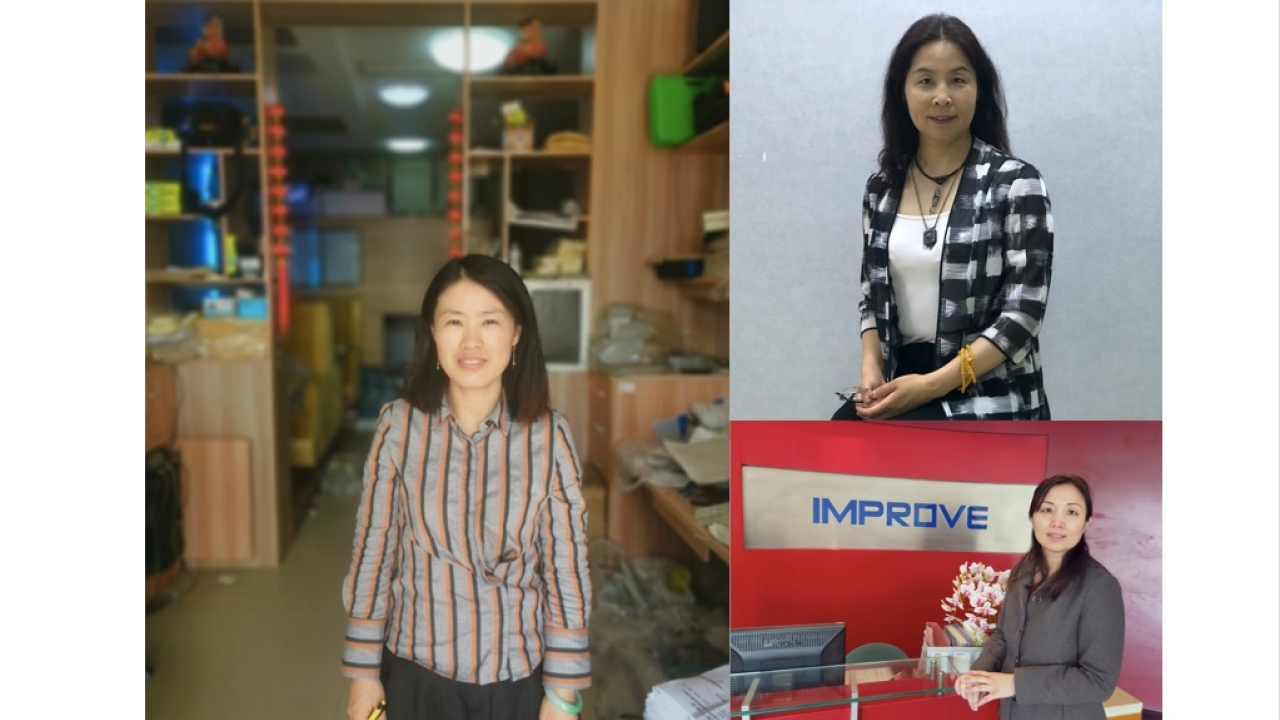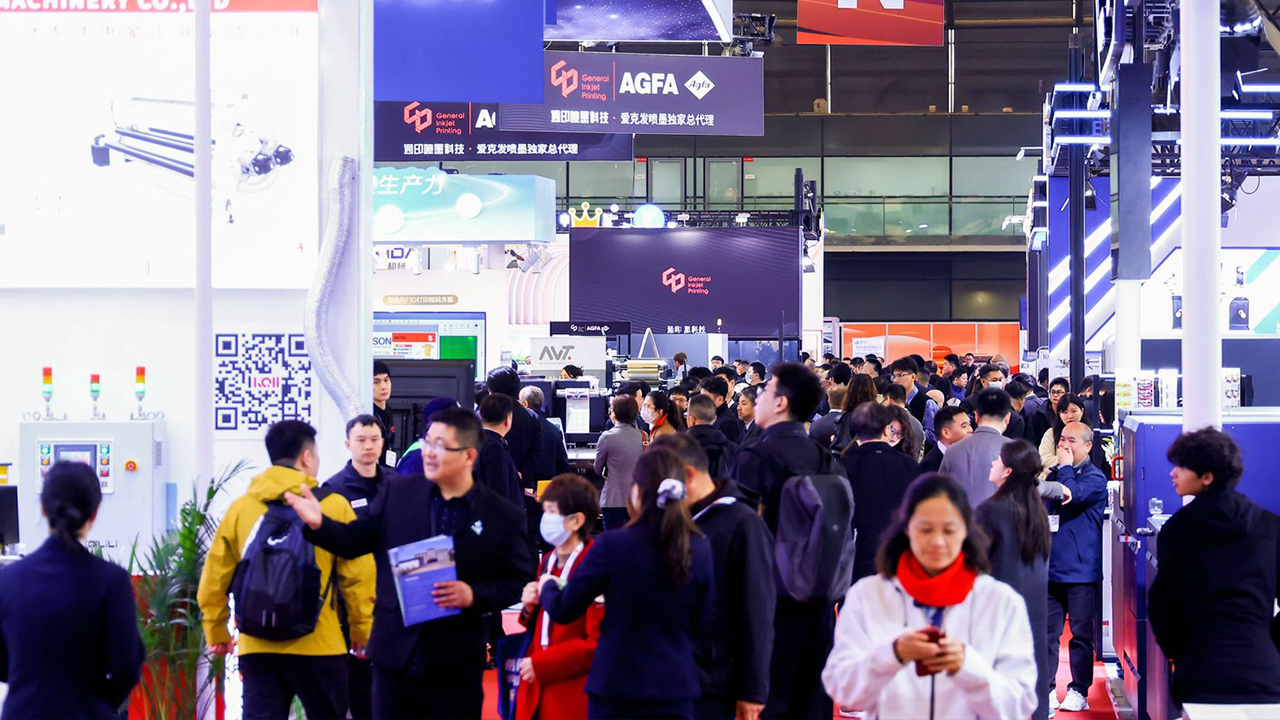Female leaders in China’s label industry

Li Yanjun, vice general manager, ZBACP
Li Yanjun joined Zhongbiao Fangyuan in 2008, moving to Zhongbiao Anti-counterfeiting Printing (ZBACP) in 2011 (Zhongbiao Fangyuan and ZBACP belong to the same group), where she now works as vice general manager.
She has also held a number of positions at key industry bodies, including deputy secretary of the professional committee of the Package Printing of China Standardization Innovation Strategy Alliance (CSISA); head of the experts committee on the National Technical Standard Innovation Committee at the Jiangxi Green Ecology Group; member of the committee of Yunnan Province’s Certification & Accreditation Association (YNCAA); and application specialist of the China Trade Association for anti-counterfeiting (CTAAC).
Chance entry
After graduating from university, Li Yanjun first worked at the Beijing Forest Bureau, before moving to Eli Lilly, a foreign-invested US company. She worked in the pharmaceutical industry for seven years in total before deciding it was not for her.
She then had started her own employment and training agency, but finding this market was not fully matured in China, finally gave up.
In 2008, Li Yanjun happened to join Zhongbiao Fangyuan where she was responsible for a packaging project involving implementation of China’s electronic pharmaceutical track and trace codes, and she quickly opened up that market to her new employer.
This project was stopped for internal reasons in 2010, so in 2011 Li Yanjun moved over to join ZBACP. ‘Before entering the printing industry, I only related it in a childish way to wood-block printing on paper materials,’ says Li Yanjun, ‘When I first started working at ZBACP and saw the small label products they were producing and selling, I realized how little I knew about the industry.
‘I had a deep understanding of the anti-counterfeiting field and it was fascinating to follow the product design and research process behind it up until final production of products which satisfied the end user’s requirements. I found each small label contains a combination of art and technology. I was deeply touched by the great art in the small label and hence found my true love in this industry.’
Along with these business developments, Li Yanjun also became gripped by the trend towards digitization in the printing industry, and suggested that ZBACP should focus on combining ‘internet and big data’ techniques besides the simple printing and die-cutting process.
In 2012, she was responsible for the implementation of a track and trace management project using China’s national ‘commodity code’ (cc code) system for major domestic brands and other special products. An example was the famous Pu’er tea brand, which was able to track its products using the ID carried on a variable QR code on each product, along with a fully worked out track and trace management system.
As a female manager, Li Yanjun doesn’t think there is any difference in the job requirements for male or female workers in this industry or in other manufacturing industries. ‘There are no differences between the capabilities of male and female workers for most jobs such as design, pre-press and management,’ she says. ‘A few posts with significantly differing requirements might be found in front-line work. Female workers prefer the technical jobs requiring less physical effort, though there are only a few females in the R&D field.’
From a company manager’s point of view, Li Yanjun says she has never allocated a specific job according to whether an applicant is a man or woman. ‘On the contrary, it’s the primary purpose of management to give full play to each employee’s potential and inspire their ambition to build a fully rounded company which can best serve the interests of employees and customers.’
Need to transform
As a state-owned enterprise, ZBACP was mainly engaged in the design and production of certificates and official documents. But as the government simplified its approvals process and reduced the use of paper certificates, the company suffered a sharp fall in business. Consequently, in 2012 ZBACP moved to a new plant and started to transform itself into a label printing business.
Starting with an existing Lintec label press, the company successively invested in a Gidue Combat flexo press, a Founder digital inkjet press, a silkscreen press, a laminating machine and high-speed die-cutting and inspection machines, and recruited new staff to the corresponding production and management posts. ‘Due to this heavy investment over such a short period and a deficiency of orders at the beginning of our new label business, the company lost nearly 6 million yuan (859,000 USD) in 2016,’ recalls Li Yanjun, who remembers the huge pressure she and others were under.
Learning from this painful experience, ZBACP decided to act proactively and accelerate its investment cycle. In 2017, the company purchased an HP Indigo digital press and installed it in a new facility just three days before going into full production.
Even then there were technical and organizational issues which needed to be urgently addressed: ‘Moving from the total unknown of HP Indigo in the beginning to endeavoring to learn the how the new facility operated, to get software and data processing systems up and running, and developing a fully standardized procedure for moving from initial order handling to meeting the customers’ requirements. Finally we had to draft a standard operation manual for the new facility, and to achieve this we usually worked overnight with less than four hours’ sleep. Only through such efforts, we took just seven months from the installation in May to turning a profit at the end of that year.’
This successful transformation became the turning point in ZBACP’s company history. Researching market demands, studying new technologies, producing high-quality products, providing excellent service, complying with and also leading the industry’s trends became the development objectives of the company.
Though entering this industry a little ‘recklessly’, Li Yanjun is truly loving it. It is her opinion that ZBACP should make its own contributions to the future evolution of the label industry while simultaneously realizing its own development.
‘I want to serve the enhancement of the safety and quality of Chinese printed products, accelerating our industrial development and improving the industry’s international status and influence,’ she says. ‘Fortunately, ZBACP has provided a platform to work with many excellent industry peers over all these years and contribute my share to the future development of this industry.’
Huang Haiying, vice general manager, Tianjin Improve
Entering the label printing industry in 2009, Huang Haiying now works as the vice general manager of Tianjin Improve Printing.
After majoring in administrative management, Huang Haiying joined the electronics division of Tianjin Improve as soon as she graduated in July 2003, where she was responsible for sales and quality control of die-cutting parts for the electronics industry. In 2009, two subsidiaries of Tianjin Improve were merged and Huang Haiying officially entered the label printing industry.
Huang Haiying admits frankly that she encountered many difficulties at the beginning, as she had no professional background and knowledge. The problems arose when communicating technical solutions to customers or discussing the company’s products with in-house technicians. ‘Though I had previously had some business cooperation with Tianjin Improve, I found there was a lot to learn after truly entering the label printing field, especially the technical process and machinery knowledge, which really are challenges.’
She made good use of her diligence, patience and strong communication skills, learned from others and soon found her own position in the industry. Since then she has performed both quality control and customer service management roles, obtaining recognition from both company leaders and customers. In 2013, Huang Haiying was assigned as the plant director of Tianjin Improve, responsible for all the production and sales work of the company.
Strive under pressure
Being promoted to management was the turning point for Huang Haiying. ‘I was very excited to get this promotion through fair and open competition. It showed that my hard work had won the acceptance of company leaders and colleagues. Then I focused on putting my ideas into practice to help develop the company,’ she says cheerily.
However, such joy at the beginning of her promotion was soon replaced by conflict. ‘On the one hand, many experienced and senior employees held ideas which clashed with the new management rules, and this brought certain obstacles to my job. On the other hand, moving from being responsible only for myself to being the manager leading the whole team was not only a change in job responsibilities but also in working methods and mindset. The key point is not only to finish ones’ own job but also to manage and supervise subordinates’ jobs.’ As a first-time leader, Huang Haiying was facing again fresh challenges in this new course in her life and career.
How to successfully manage a manufacturing plant? Huang Haiying learned from many excellent domestic and international peers whose management experience had been accumulated over many years, and joined this to her own understanding of recent trends in China’s label market.
She concludes: ‘Label printing is a minor manufacturing industry, so we must focus on market and customer needs. To be a leading company, we need to work towards more innovated products and processes while supplying high-quality products and service.’
Following the principle, ‘market-driven, result-oriented’, Huang Haiying boldly introduced reforms in the Tianjin Improve plant, building standard management and staff training procedures and focusing on effective implementation of the new management system. Through perseverance and hard work, these reforms have resulted in a single ‘simplified, high efficiency and fast response’ manufacturing team.
At the same time, to better understand market needs, Huang Haiying welcomed customers to the plant for on-site training. ‘We invited them to share with us their updated standards and their requirements in the food, pharmaceuticals, electronics etc industries, so that we could improve our internal management procedures to match these developing requirements. All these initiatives helped lay good foundations for our standardized production procedures,’ says Huang Haiying.
Tianjin Improve built its first subsidiary, Wuhan Ying’ai, in 2012 in Wuhan, while the second subsidiary, Suzhou Ying’yi, went into production in 2016. Headquartered in Tianjin with manufacturing bases in eastern and central China, Tianjin Improve has officially realized its scale development goals.
Female preference
From the initial challenges to today’s leadership role, Huang Haiying has written her own history in the label industry from a female point of view. As for female workers in wider manufacturing sectors, as long as they make good use of their own advantages and are willing to work hard, they are just as capable of doing the same jobs as males, Huang Haiying believes. ‘Particularly following the increasing automation levels in the label printing industry, physical work has become less and less important, meaning woman workers can operate the whole range of facilities. Our workshop supervisor in Tianjin Improve is just such an excellent woman, and the female die-cutting team leader has been awarded as an outstanding worker every year.’
Huang Haiying says women’s unique characteristics are a definite advantage in the printing industry. ‘Their careful communication skills and empathy have the potential to make customer and colleague communication easier. At present, female employees in Tianjin Improve account for nearly 40 percent of the workforce. Many customers have high praise for the women in our team.’
Since its establishment in 1998, Tianjin Improve has followed the principles of ‘reform, innovation, focus’. Today the company runs three Omet flexo presses, two Mark Andy flexo presses and one HP Indigo digital press. The total sales of the Improve Group were 100 million yuan (14.3m USD) in 2019.
At the beginning of 2020, due to the influence of Covid-19, production and operation were a little slow. But Huang Haiying took advantage of the reduced pace of production to review and consider strategies for future development.
While both the Tianjin and Suzhou plants have gradually recovered production, the Wuhan subsidiary has not yet fully recovered; the former two plants, however, are sufficient for normal delivery for all Wuhan customers’ orders – which demonstrates the importance of strategic planning for the development of the company.
The company is also considering a move into the south China market in the future.
Xiang Susu, deputy manager, Tianjiao Print
Influenced by a family printing background in her childhood, Xiang Susu joined the label printing industry as soon as she graduated in 2003. Starting out as a secretary, she made full use of her spare time to learn pre-press and design, then customer jobs from their purchase orders to completion. Today she has become the deputy manager of Tianjiao Print and is mainly responsible for finance and some sales work.
Entering the printing industry as a female, Xiang Susu acknowledges that there indeed were certain challenges. First, the traditional printing environment in the workshop. Compared with other jobs, there is inevitably ink odor and disorder in the printing workshop. Second, the 24-hour working system, especially with some purchase orders requiring constant follow-up, means overtime working is frequent, and could happen at any time. Finally, different customers have different requirements for products, especially for new products where they don’t even have a clear idea of their needs, so have to discuss and communicate with sales representatives to come up with a final solution.
None of these factors are a problem for Zhejiang-born Xiang Susu, who grew up surrounded by the printing industry. She has her own opinions about why women should choose this as a profession. ‘I think printing is not simply a part of packaging, but can also express the quality of the product and its brand value to customers. It’s an important marketing tool. As a printing worker, I am proud and appreciated for this job.’
Passion
Although passion, appreciation and pride are apparent from the start of our interview with Xiang Susu, there are also times when she wonders if all her day-to-day efforts are worthwhile, especially when faced with undeserved complaints and even suspicion from customers.
‘Sometimes I spend whole nights in an effort to develop a project which the customer may rubbish in a minute. At those times I really do have my doubts. But I am not an easily defeated person. I know clearly that the more such things happen, the more effort I need to put in. This may also become the wheel that drives my progress forward.’
Xiang Susu’s belief is that to do things well is the most important thing; she will never give up because of a bad day at the job.
Indeed, her ‘never give up’ character has meant Xiang Susu has learned a lot from failures and has gradually gained the confidence of even the most difficult of customers. By agreeing a final solution after much communication with these customers and delivering on it, Xiang Susu actually feels a deeper sense of pride and personal value when seeing that customer’s products successfully listed and on shelves. This sense of achievement and satisfaction has supported her 17-year label printing career.
Better future
Though Tianjiao Print was also hit by the Covid-19 epidemic at the beginning of 2020, Xiang Susu is still optimistic for the future of the label printing industry.
Tianjiao Print accomplished the transition to digital printing in 2019. It installed a Heidelberg 7100UV 5-color digital press in 2017, then a Heidelberg 9100 4-color digital press and an HP Indigo 6900 digital press in 2019. Besides this there are three Reborn digital die-cutting machines. At present, half of the orders processed by Tianjiao Print were printed digitally.
Tianjiao’s business mainly covers labels for medicine and medical machinery. During the epidemic, it received plenty of orders relating to medical machinery, some of which were extremely urgent. ‘The digital press with its ease of operation and short lead times really showed its advantages and value at this point. Almost all the orders being produced by our digital press could be accomplished within 24 hours,’ says Xiang Susu. She notes that all the company’s non-Covid infected employees had to do several jobs: they were designers, sales people as well as customer service representatives and more.
As to the logistics hit caused by the epidemic – including the rising cost of raw materials and consumables from February to April – Tianjiao Print decided to absorb a part of these costs as the best contribution towards fighting the virus.
Tianjiao Print also promptly adjusted its development strategy to relieve the impact of the epidemic. For example sales, customer service and factory management were carried out online as well as on-site.
‘Now female workers account for one third of our total employees,’ says Xiang Susu proudly. ‘Females do face more pressure, especially those with family and kids. It has been particularly difficult for them to overcome the twin challenges of job and epidemic.’
‘Modern society requires more jobs to be open to females,’ concludes Xiang Susu. ‘We and other printing companies need to make more efforts to help out with the home and work pressures they face, which will give us all access to a better future.’
Stay up to date
Subscribe to the free Label News newsletter and receive the latest content every week. We'll never share your email address.


